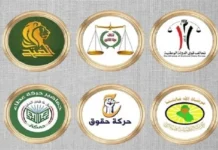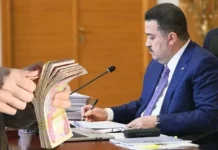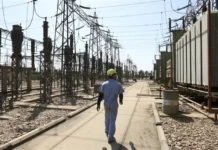Tishwash: Bilateral meeting with China: Iraq seeks to strengthen its relationship with its neighbors, especially Kuwait.
Prime Minister and Minister of Foreign Affairs Fuad Hussein affirmed on Monday that dialogue and negotiation are the best way to resolve regional disputes, noting Iraq’s efforts to strengthen its relations with neighboring countries, particularly Kuwait.
The Ministry of Foreign Affairs said in a statement received by Dijlah News that “Deputy Prime Minister and Minister of Foreign Affairs Fuad Hussein met on Monday with the Chinese government’s Special Envoy for Middle East Affairs, Zhai Jun, on the sidelines of the conference hosted by the United Nations on the Palestinian issue, at the headquarters of the Iraqi mission to the organization in New York.”
He added, “The meeting discussed bilateral relations between Iraq and China, and exchanged views on the situation in the region, particularly developments in the Palestinian issue and the worsening humanitarian tragedy in Gaza.”
The statement added that “the minister highlighted Iraq’s position on the ongoing events in Gaza,” while expressing his thanks to China for “its supportive stance on Palestinian rights and its standing with the Palestinian people during the difficult circumstances they are experiencing.”
He pointed out that “Fuad Hussein reviewed Iraq’s vision regarding the overall situation in the region,” and while stressing that “dialogue and negotiation constitute the best way to resolve regional disputes,” he pointed out that “Iraq seeks to strengthen its relations with neighboring countries, especially with the sisterly State of Kuwait, in a way that ensures the building of distinguished relations based on mutual respect and common interests.”
The statement quoted the Chinese envoy as saying that his country “supports Iraq’s positions and balanced policies on regional issues,” noting that “the two sides share identical views regarding the need to enhance regional stability and intensify joint efforts to achieve security and peace.” link
************
Tishwash: Payment of dues in black oil and tightening controls at ports are the main reasons for the dollar’s decline.
10 interpretations from expert Manar Al-Abidi
Economic researcher Manar Al-Obaidi reviewed 10 reasons behind the decline in the dollar exchange rate against the dinar in Iraqi markets on Monday, stressing that they have collectively created an economic environment that has contributed to strengthening the dinar’s value.
He pointed out that these reasons range from direct economic factors, such as deflation and a decline in spending, to procedural and regulatory factors, such as tightening border controls and traders’ shift to the formal banking system, in addition to circumstantial factors related to the elections and the increasing number of expatriates.
The exchange rate of the dollar against the Iraqi dinar has witnessed a significant decline recently. This decline is due to a combination of intertwined economic and procedural factors, which vary in their impact but have collectively contributed to strengthening the dinar.
The most prominent of these factors are:
1- Economic contraction and declining consumer confidence:
The uncertainty facing the Iraqi market due to the economic slowdown has led to a decline in individual and institutional spending confidence, negatively impacting overall demand and thus reducing the need for the dollar as a catalyst for trade.
2- Stopping government investment expenditures:
The government’s focus on operating spending rather than investment has slowed economic activity. Since the general budget is the primary driver of economic activity, reducing investment spending has reduced aggregate demand, including demand for the dollar.
3- Tightening control over border crossings:
Government measures to prevent smuggling and regulate relations with the Kurdistan Region have helped curb the phenomenon of overbilling, reducing the unreal demand for dollars on the parallel market.
4- Merchants’ transition to the formal banking system:
Markets have witnessed a large segment of traders entering the formal banking system and adopting the official dollar exchange rate through approved platforms, which has reduced trading volume in the parallel market and eased pressure on the dollar.
5- Decline in re-export operations:
The decline in re-export activity to neighboring countries has reduced demand for imported goods, which has directly impacted the need for dollars to finance these trade transactions.
6- Settling the dues of major companies with petroleum products instead of cash:
The government has settled part of its debts to foreign companies in black oil and naphtha instead of cash, reducing reliance on dollars sold by the central bank and increasing their supply in the market.
7- Preparations for the electoral process:
As the election season begins, campaign spending increases. This spending is often financed from dollar reserves, which necessitates converting large amounts of these reserves into dinars to cover campaign expenses, thus increasing the supply of dollars.
8- Increase in the number of foreign visitors and arrivals:
The increasing number of immigrants to Iraq has brought significant amounts of foreign currency into the local market, providing an additional source of hard currency outside of central bank sales and contributing to increased dollar availability.
9- The cessation of illegal trade as a result of the closure of the border with Syria:
The closure of border crossings with Syria has curbed smuggling and illegal trade, which was heavily reliant on dollars on the parallel market, leading to a further decline in demand for the dollar.
10- Decrease in the issued currency and withdrawal of part of it from the market:
The Central Bank of Iraq withdrew a portion of the dinar money supply from the market, creating a double demand for the Iraqi dinar against the dollar. This balance in demand for the two currencies helped strengthen the value of the dinar and raise its exchange rate against the dollar in the parallel market. link
************
Tishwash: Iraq replaces the dollar with gold: a yellow shield against economic storms.
Economic expert Nasser Al-Kanani revealed on Monday (July 28, 2025) that Iraq’s position as the Arab country with the largest gold purchases represents a strategic shift in the Central Bank’s approach to enhancing the country’s financial stability.
Al-Kanani told Baghdad Today, “Iraq’s purchase of more than 20 tons of gold in a single year, and its rise to seventh place globally in this field, reflects a calculated move by the Central Bank to protect the national economy from fluctuations in foreign currency prices, especially the dollar.”
He pointed out that “gold is considered one of the safest reserve instruments, as it is not affected by fluctuations in the monetary market, unlike paper currencies. This gives Iraq a strategic advantage in confronting sudden crises and enhances confidence in its financial policies, both domestically and internationally.”
Al-Kanani explained that “this trend will positively impact the value of the Iraqi dinar in the medium term. It will also contribute to the stability of the local market and reduce reliance on the dollar, giving the Central Bank greater flexibility in managing monetary policy and achieving economic stability in light of current regional and global challenges link





